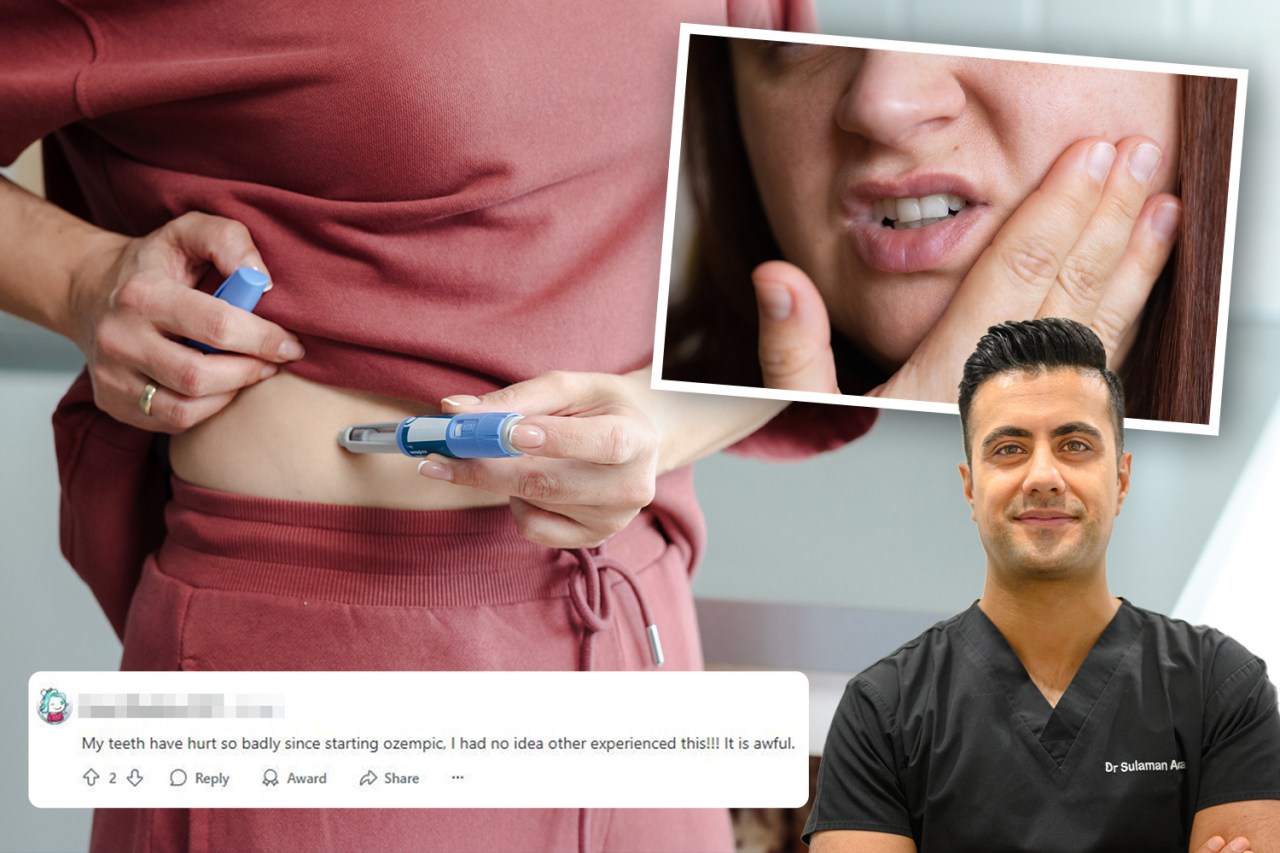Health
Experts Warn GLP-1 Weight Loss Drugs May Harm Dental Health

The increasing popularity of GLP-1 weight loss medications, such as Mounjaro and Ozempic, has raised concerns about potential side effects, particularly related to dental health. Reports indicate that some users are experiencing significant dental issues, a phenomenon some are referring to as “Ozempic teeth.” This term encompasses a range of oral health problems, including tooth decay, dry mouth, and gum disease, affecting around 1.5 million individuals in the United Kingdom who are prescribed these drugs.
Dental professionals are sounding the alarm as they witness a troubling pattern among patients using these medications. According to Dr. James Goolnik, a dentist and founder of Optimal Dental Health in London, there is a marked increase in dental issues among users of GLP-1 medications. “The biggest problem is dry mouth (xerostomia), which affects 100 percent of my patients who are on these drugs,” he stated. He emphasized that saliva plays a crucial role in protecting teeth, and a lack of it can lead to increased risks of decay and gum disease.
Recent research published in the journal *Medicine* has highlighted a strong connection between the use of semaglutide—found in medications like Mounjaro, Ozempic, and Wegovy—and reduced saliva production. This decrease in saliva may be linked to dehydration caused by common side effects of the drugs, which include vomiting and diarrhea, or it could result from inflammation of nasal passages leading to mouth breathing.
Dental specialists like Dr. Sulaman Anwar, a periodontist based in London, have also noted the emergence of new symptoms in patients taking these medications. “At least 10 percent of my patients, if not more, are on weight loss medication,” Dr. Anwar remarked, describing cases of rapid weight loss accompanied by dental issues. He recounted a recent patient who, after losing a significant amount of weight on semaglutide, developed early signs of tooth decay and enamel softening.
The impact of these medications extends beyond dental health. Users may experience altered taste sensations, as noted by researchers at the University of Pennsylvania. This impairment can discourage individuals from maintaining healthy diets, further complicating their oral health by leading to increased sugar consumption.
To mitigate the risks associated with GLP-1 medications, dental professionals recommend proactive dental care. Dr. Goolnik advises patients to monitor their oral health closely, especially if they notice any unusual changes. He emphasizes the importance of communicating with dental providers about medication use, as many dentists are adapting their practices to accommodate the needs of patients on these drugs.
Strategies for Maintaining Dental Health
For those using GLP-1 medications, following a few practical strategies can help protect dental health. Dr. Goolnik suggests several steps:
1. **Eat Crunchy Vegetables**: Raw vegetables like carrots and broccoli can help remove plaque from teeth, while leafy greens such as spinach and kale contain iron, which strengthens enamel.
2. **Stay Hydrated**: Regularly sipping water throughout the day can combat dry mouth, a common side effect of these medications.
3. **Practice Good Oral Hygiene**: Regular brushing and flossing are essential for keeping the mouth free from food debris and plaque.
4. **Incorporate Dairy**: Consuming dairy products or sugar-free alternatives can provide calcium and protein, which are crucial for strong teeth.
5. **Snack on Nuts**: Raw, unsalted nuts are beneficial as they promote saliva production and are low in carbohydrates, which can contribute to tooth decay.
6. **Choose Low-Acidity Fruits**: Fruits like strawberries and apples can help whiten teeth and stimulate gum health.
7. **Chew Sugar-Free Gum**: Gum containing xylitol can reduce cavities and combat bad breath while increasing saliva flow.
While GLP-1 medications offer significant benefits for weight loss, their potential side effects, including those affecting dental health, necessitate careful monitoring and proactive care. As the landscape of weight management evolves, both patients and healthcare providers must remain vigilant about the implications of these treatments on overall health.
In light of these developments, it is essential for individuals considering or currently using GLP-1 medications to engage in open discussions with their healthcare providers to ensure they are taking the necessary precautions for their dental health.
-

 Health2 months ago
Health2 months agoNeurologist Warns Excessive Use of Supplements Can Harm Brain
-

 Health2 months ago
Health2 months agoFiona Phillips’ Husband Shares Heartfelt Update on Her Alzheimer’s Journey
-

 Science2 weeks ago
Science2 weeks agoBrian Cox Addresses Claims of Alien Probe in 3I/ATLAS Discovery
-

 Science2 weeks ago
Science2 weeks agoNASA Investigates Unusual Comet 3I/ATLAS; New Findings Emerge
-

 Science2 weeks ago
Science2 weeks agoScientists Examine 3I/ATLAS: Alien Artifact or Cosmic Oddity?
-

 Entertainment4 months ago
Entertainment4 months agoKerry Katona Discusses Future Baby Plans and Brian McFadden’s Wedding
-

 Science1 week ago
Science1 week agoNASA Investigates Speedy Object 3I/ATLAS, Sparking Speculation
-

 World2 months ago
World2 months agoCole Palmer’s Cryptic Message to Kobbie Mainoo Following Loan Talks
-

 Entertainment3 months ago
Entertainment3 months agoEmmerdale Faces Tension as Dylan and April’s Lives Hang in the Balance
-

 Science1 week ago
Science1 week agoNASA Scientists Explore Origins of 3I/ATLAS, a Fast-Moving Visitor
-

 Entertainment4 months ago
Entertainment4 months agoLove Island Star Toni Laite’s Mother Expresses Disappointment Over Coupling Decision
-

 Entertainment2 months ago
Entertainment2 months agoMajor Cast Changes at Coronation Street: Exits and Returns in 2025









